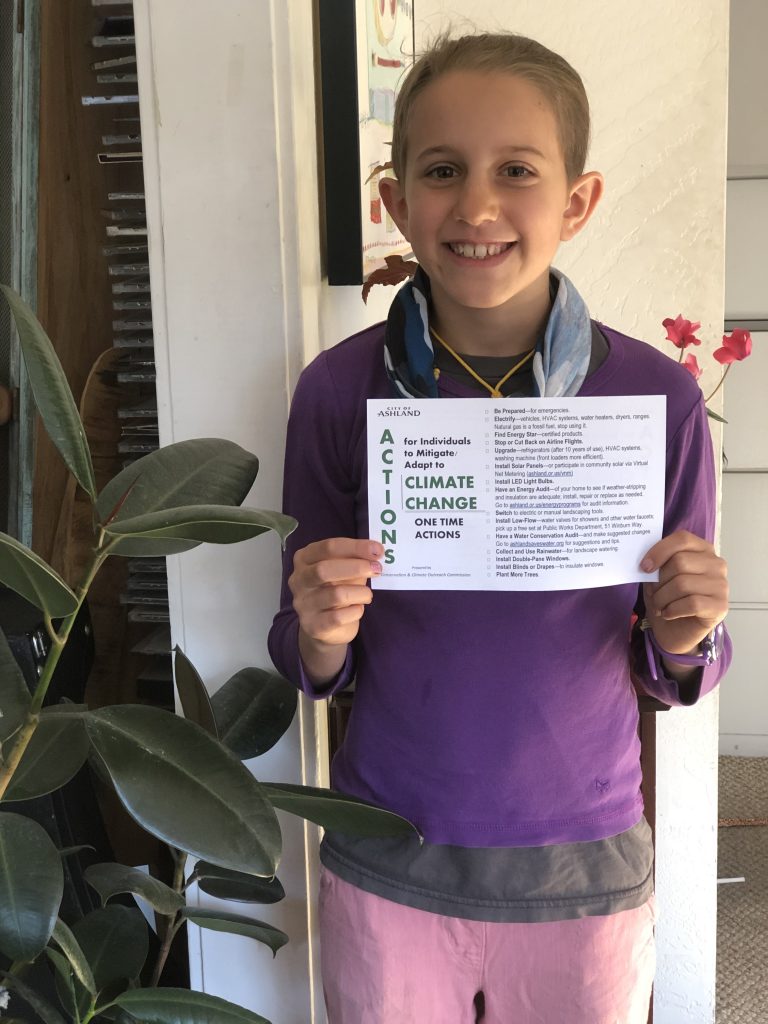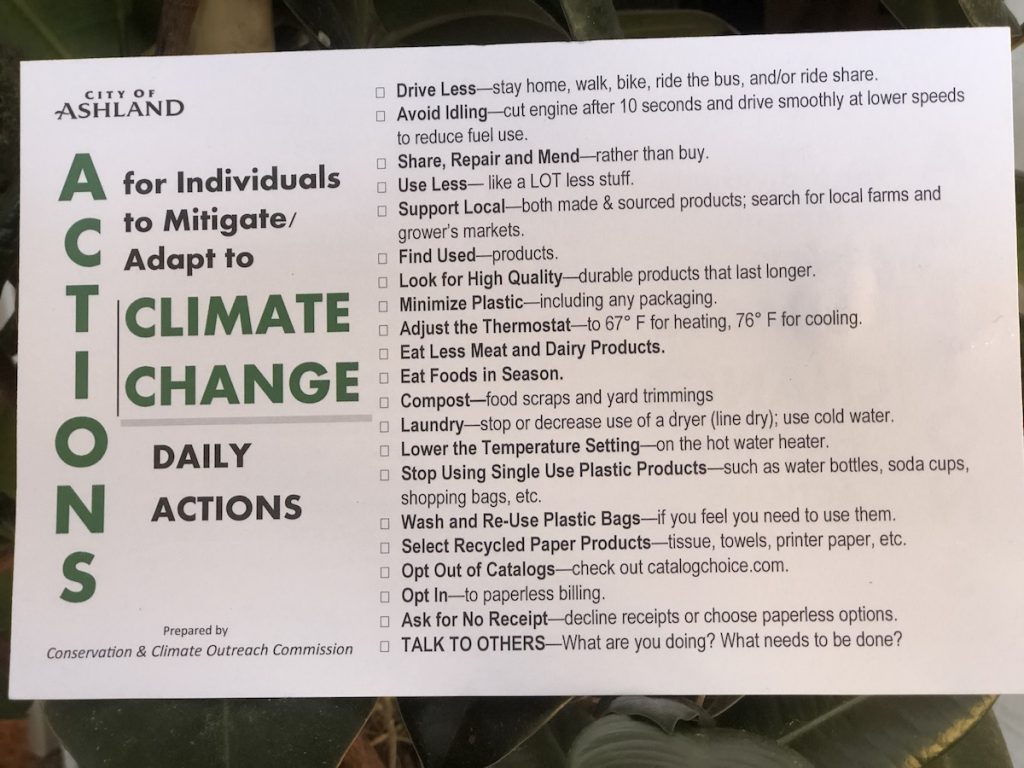
Climate change mitigation, actions you can take
Does what you do matter for climate change mitigation? Can individuals make a difference? I biked down to the Trinity Church this morning to learn more about the City of Ashland’s efforts to reduce greenhouse gasses and become more eco-friendly.
A community educator named Marion Moore gave a presentation to about 25 people who care enough about the environment to come out early on a Sunday morning.
I don’t know about you but it’s easy for me to get overwhelmed about climate change and to feel like there’s nothing we can do to stop it. But, according to Marion Moore, individuals CAN take action and effect change. At the meeting, sponsored by the City of Ashland, Marion Moore explained that small steps really do make a big difference.
Among her eco-friendly recommendations specific to Southern Oregon: electrify.
Electricity in the Rogue Valley is mostly “clean” energy, generated by hydroelectric dams. So when you switch to electricity from gas (for appliances, home heating, and even your car), you can greatly reduce fossil fuel consumption.
Moore, who is part of the Ashland Conservation and Climate Outreach Commission, gave each of us an Executive Summary of Ashland’s Climate and Energy Action Plan and a City of Action climate action card. On one side of the card are big one-time recommendations (like installing low-flow toilets, having a Water Conservation Audit of your home, and installing solar panels).
On the other are small daily action items, which include not idling your car engine, mending broken things instead of buying new stuff, and washing your clothes in cold water.
I love this list of ACTIONS FOR INDIVIDUALS FOR CLIMATE CHANGE MITIGATION. (I love it so much I had to write that in capital letters.)
Some naysayers insist it’s naive to think humans can take action for climate change mitigation, but there are so many ways to make your life more sustainable. I believe in self-imposed persistent optimism, a phrase coined by climate change activist and global health advocate Dr. Paul Zeitz. And I believe that every one of these changes not only helps the environment and the planet, it improves the quality of your relationships as well.
Here are the 9 small changes that make a big difference for climate change from the Ashland Conservation and Climate Outreach Commission that resonated the most with me:
1. Drive less—bike, walk, scooter, ride the bus, and carpool. When you do drive, park farther away and walk.
2. Don’t idle your car, ever!—idling spews pollution into the air and hurts children’s lungs. Plus if you leave your car idling with the keys in it, you’re inviting someone to steal it. I’m surprised that so many people don’t know this but it’s MUCH BETTER for the environment to turn your car off after 10 seconds. I’d love to see a nationwide campaign to stop car idling.
3. Share, repair, and mend—instead of throwing it away, fix it!
4. Use less—most of us buy way more stuff than we need or can even use. Use less than you’re using now.
5. Support local—the more local the better. We are blessed to live in a place with an abundance of fresh produce, local artisans, and locally produced goods. Many trees, even now, are laden with apples and persimmons. Ask your neighbors if you can pick some instead of buying trucked in fruit from far away.
6. Buy used—that way you’re not supporting the first world economy, participating in generating greenhouse gasses, or in worker exploitation.
7. Minimize plastic—this is so hard but so important. Single-use plastic is the worst. You can find some of my best ideas about getting the plastic OUT of your life in this post.
8. Wash your clothes in cold water—we’ve been doing this for years. We even washed all of our babies’ cloth diapers in cold water. I haven’t done a load on warm or hot in forever and our clothes are just as clean. (Plus we make our own laundry detergent out of gray water we catch from the shower. But that’s pretty extreme…)
9. Compost!—If you don’t have space outside, you can have an odorless worm bin under the sink. Another great tip: save all your carrot tops and vegetable peelings in a bag or glass jar in the freezer. When the bag is full make bone broth or vegetable stock. That way you get the water-soluble nutrients from them and those veggies scraps and citrus peelings will decompose more quickly.

Climate change mitigation: small actions really do make a big difference!
I left the meeting feeling hopeful, eager to buy less and consume less. Think I can convince the family that we should exchange experiences, poetry, and previously loved gifts this year?
What are your favorite individual actions for climate change mitigation? Please share your ideas in the comments below so we can all do our best to do better.
Leave a Reply